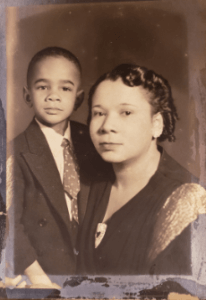
Note: Gilcrease is honored to have acquired this collection. It is necessary to re-house, archive, and provide the appropriate conservation before it’s accessible for exhibition or available for community research. Please watch our website for updates regarding availability of this important collection.
Gilcrease Museum announced today it has received the Eddie Faye Gates Tulsa Race Massacre Collection, which contains a wealth of eye-witness accounts, photographs, recorded survivor stories and other narratives of the 1921 Tulsa Race Massacre.
The collection is a gift of Tulsan Eddie Faye Gates and reflects the life, legacy and work of the leading African American teacher, author and community activist. Throughout her life Gates has felt an affinity for the overlooked and oppressed, and following her appointment to the Tulsa Race Riot Commission in 1998 she labored tirelessly to recover the forgotten voices of survivors of the 1921 Tulsa Race Massacre. She preserved her work through photographs, correspondence, handwritten research notes, newspaper and periodical clippings, and a vast collection of audio and video interviews with survivors.
“It became her mission to ensure the atrocities that occurred during the 1921 Race Massacre are not forgotten, and that the survivors’ stories serve to make needed change,” said Dianne Gates-Anderson, Gates’ daughter. “It is also important to her and our family that the collection be physically located in North Tulsa and accessible for viewing and research by descendants and the community at large. This is our story and we want it preserved and accessible to us. We also selected Gilcrease not only for its location but based on the museum’s ability to conserve the collection and make the materials available for exhibitions and research by scholars worldwide.”
“Eddie Faye Gates played a pivotal role not only in capturing this important history, but also served as a catalyst for change and reconciliation,” added Phil Armstrong, project director for the world-class history center, Greenwood Rising. “This collection has deep cultural and national significance, and I believe people will be excited to see this collection preserved and accessible for the education of generations to come.”
Gilcrease recently received a two-year, $299,710 grant from the Institute of Museum and Library Services (IMLS) dedicated to this collection that will help the museum create digital public access to many of these survivor accounts and photographs and provide unique perspective as Tulsa and the country focus next year on the 100th anniversary of the 1921 Tulsa Race Massacre. While Gilcrease plans to host a teacher institute in 2021, the grant allows the museum to build a long-term foundation for education, research and exhibition that will serve the community and live beyond the 100th anniversary of the Race Massacre.
“The investment that Gilcrease Museum is making to preserve and share this important history is critical in bolstering our work,” said Sen. Kevin Matthews, founder and chair of the 1921 Tulsa Race Massacre Centennial Commission. “Both the Commission and the Museum are not just committed to remembering the past, but looking to the future. This gift presents Gilcrease and the community with a unique opportunity to learn, build and work with one another for a better Tulsa.”
Gilcrease Museum staff have selected 100 oral histories and 600 photographs to study, digitize and create resources for teaching trauma-based history that will be used primarily by K-12 educators. Scholars and thought leaders on the topic will serve as project advisors supporting the broad dissemination of findings within the local African American community and beyond.
“We are honored to receive this important collection, and we hope to lift up Eddie Faye Gates’ story as well as the many stories she gave life to through her tireless work,” said Susan Neal, executive director of Gilcrease Museum. “This is an exciting opportunity for all of Tulsa, and we are thrilled to have the opportunity to conserve, archive and research this collection as well as partner with other institutions in its exhibition.”
With the gift, supplemented by the museum’s extensive archival collection chronicling the forced removal of southeastern Native American tribes, Gilcrease Museum will address stories of tragedy, resiliency and resurgence of African Americans who were displaced with these tribes to Oklahoma and eventually gave birth to the Greenwood community and Black Wall Street.